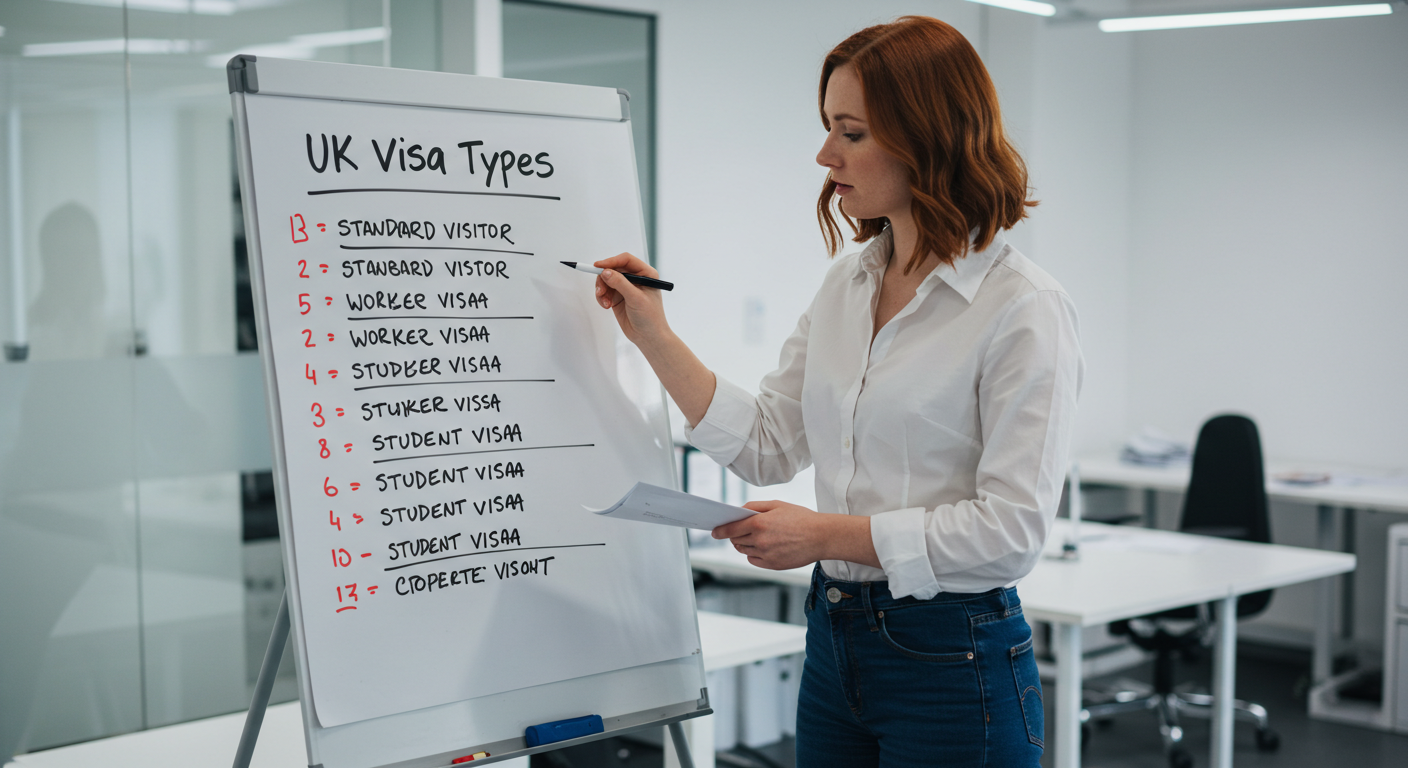Introduction to UK Visa Types
A visa is an essential document that permits individuals to enter, stay, and sometimes work in a foreign country. In the context of the United Kingdom, various visa types cater to diverse needs and situations for foreign nationals wishing to enter its borders. The UK visa system is an intricate framework that reflects the country’s immigration policies, and it aims to manage the flow of people based on specific criteria. Understanding the different types of UK visas is crucial for anyone considering travel, work, or residency in the UK.
The significance of visas cannot be overstated; they serve as a gateway for thousands of individuals each year who seek to visit the UK for tourism, education, family reunification, or employment. The choice of visa largely depends on several factors, including the applicant’s nationality, the primary purpose of their visit, and the intended duration of their stay. For instance, a student may require a Tier 4 Student Visa, while someone visiting for business might opt for a Standard Visitor Visa.
Additionally, the UK offers specialized visas for various situations, such as the Innovator Visa for entrepreneurs and the Skilled Worker Visa for those with specific job offers in the UK. Each visa type has its own eligibility criteria, required documentation, and application process, making it imperative for individuals to thoroughly assess their circumstances before proceeding. By aligning one’s purpose for entering the UK with the appropriate visa type, applicants can enhance their chances of a successful entry into the country.
As immigration policies and visa regulations may evolve, it is advisable for prospective travellers and residents to stay informed about the latest guidelines and application procedures related to UK visas. It is essential to engage with official government resources or seek professional advice when determining the most suitable visa option for individual needs.
Short-Term Visitor Visas
The Standard Visitor visa is a crucial option for individuals wishing to visit the United Kingdom temporarily. This visa type allows for stays of up to six months, catering primarily to those intending to engage in tourism, family visits, or short business trips. Understanding the eligibility criteria is vital for a successful application. Applicants must demonstrate their intention to leave the UK at the end of their visit, possess adequate funds to support their stay, and have a valid passport or travel document. Those applying must also show that they can meet the specific requirements related to their purpose of visit.
Permitted activities under the Standard Visitor visa include tourism, attending business meetings, participating in short courses, and receiving medical treatment. Nevertheless, certain activities are explicitly prohibited. Visa holders should refrain from working, studying for longer than 30 days, or accessing public funds. Understanding the boundaries of permitted activities can help avoid any complications during your stay.
The application process is straightforward but must be approached with diligence. Prospective visitors are required to apply online, providing personal details, travel history, and reasons for their visit. It’s important to have all necessary supporting documents ready, including proof of accommodation and financial means. Depending on the applicant’s nationality, biometric data may also need to be provided at an official location. Processing times vary; therefore, applicants should consider applying well in advance to accommodate any unforeseen delays.
Ultimately, the Standard Visitor visa serves as a gateway for many to experience the rich culture and heritage of the UK. Familiarizing oneself with the specific requirements and application procedure is essential to navigate this process smoothly and enjoy a fulfilling visit without unnecessary issues.
Work Visas
The United Kingdom offers a variety of work visas, each designed to cater to different employment needs and circumstances. Understanding these visas is essential for both employers seeking to recruit overseas talent and individuals aiming to work in the UK. The main categories of work visas include the Skilled Worker visa, the Intra-Company Transfer visa, and the Temporary Worker visa.
The Skilled Worker visa is intended for individuals who have received a job offer from a UK employer that holds a valid sponsorship license. To qualify, applicants must meet specific eligibility criteria, including a minimum salary threshold and English language proficiency. This visa allows skilled workers in various occupations, ranging from healthcare professionals to IT specialists, to live and work in the UK for up to five years, with the possibility of indefinite leave to remain thereafter. It is also worth noting that applicants must provide evidence of their job offer and sponsorship.
Another significant option is the Intra-Company Transfer visa, which enables multinational companies to transfer employees from their overseas offices to a UK branch. This category is designed for employees who have worked for the company for a specified period and occupy roles that meet the eligibility criteria, including skill and salary requirements. Like the Skilled Worker visa, it requires sponsorship from the UK branch of the company and allows workers to remain in the country temporarily or for longer durations, depending on their specific circumstances.
Lastly, the Temporary Worker visa is aimed at individuals coming to the UK for short-term work. This includes various subcategories such as the Creative and Sporting Worker visa and the Government Authorized Exchange visa. Applicants are often required to demonstrate that they have secured a job offer from a UK employer, who must also be a licensed sponsor. The duration of stay on a Temporary Worker visa depends on the specific job and can range from several months to a few years.
Student Visas
The Student visa is designed for international students wishing to pursue their education in the United Kingdom. To be eligible for this visa, applicants must be at least 16 years old and have been accepted by an approved educational institution, such as a university or college that is authorized by UK Visas and Immigration (UKVI). This pathway enables individuals to study full-time in various fields, ranging from higher education to vocational training. The institution must hold a valid sponsorship license, and the course duration should typically be at least six months, allowing for an enriching academic experience.
When applying for a Student visa, specific documents are required. Applicants must provide a valid Confirmation of Acceptance for Studies (CAS) from their educational institution, proof of sufficient funds to cover living costs and tuition, as well as evidence of English language proficiency, usually demonstrated through standardized tests like IELTS or TOEFL. Furthermore, health insurance coverage is also essential, as it supports access to the National Health Service (NHS) during their stay in the UK.
Once granted the visa, holders are expected to adhere to certain responsibilities. Notably, they are permitted to work part-time, but there are restrictions in place; students can generally work up to 20 hours per week during term time and full-time during holidays. Maintaining enrollment is crucial, as failure to comply with the terms of the visa—like attendance and satisfactory academic progress—can jeopardize their stay. Additionally, it is imperative for students to keep track of their visa expiration and initiate the renewal process timely to avoid overstaying their permitted duration in the UK.
Family Visas
Family visas are essential for individuals who seek to join their family members residing in the UK. This category of visas allows the separation of families to be addressed, offering various subcategories tailored to distinct relationships. Among the most common are Spouse or Partner visas, Family reunion visas, and Child visas, each with unique eligibility criteria and requirements.
The Spouse or Partner visa is designed for individuals who are married to or in a civil partnership with a person who is a British citizen or settled in the UK. Applicants must demonstrate a genuine and subsisting relationship, proving factors such as cohabitation and shared financial responsibilities. Additionally, there is a minimum income threshold that the sponsoring partner must meet, ensuring sufficient financial stability to support the applicant without recourse to public funds.
Family reunion visas enable refugees or individuals with humanitarian protection to bring their family members to the UK. This type of visa recognizes the importance of familial support, particularly in times of crisis. To qualify, applicants must provide evidence of their familial relationship, often requiring documentation such as birth certificates or marriage certificates. The focus here is on maintaining the family unit, which can be crucial for emotional and psychological wellbeing.
Child visas cater to minors who wish to join their parent or guardian in the UK. Eligibility for this visa requires the parent or guardian to hold settled status or British citizenship. The application process includes demonstrating the child’s relationship with the adult sponsor, alongside fulfilling other requirements such as financial capability and appropriate accommodations. It is imperative for applicants to be aware of the intricacies involved, including age limits for dependents.
In conclusion, family visas in the UK encompass various pathways to reunite families. Understanding these subcategories and their requirements greatly aids individuals in selecting the correct visa type for their unique circumstances.
Ancestry Visas
Ancestry visas represent a unique pathway for Commonwealth citizens who have British ancestry to gain residency in the United Kingdom. This visa option is primarily aimed at individuals who can prove that one of their grandparents was born in the UK, the Channel Islands, or the Isle of Man. To qualify for this visa, applicants must demonstrate their lineage through official documents, which may include birth certificates, marriage certificates, and any relevant ancestry information tracing back to the grandparent born in the UK.
In terms of eligibility, the individual applying for an Ancestry visa must be a citizen of a Commonwealth country and must be 17 years or older at the time of application. Additionally, they must intend to work or seek employment in the UK. A crucial aspect of the application process is proving that the applicant is self-sufficient and can support themselves financially during their stay. As a result, submitting evidence of funds or employment prospects can be essential.
The Ancestry visa allows holders to reside in the UK for an initial period of five years. During this time, visa holders are permitted to work, study, and enjoy other rights akin to permanent residents. After the five years have elapsed, they may be eligible to apply for Indefinite Leave to Remain, which offers permanent residency status. It is important for applicants to be aware of the application timeline, as processing times can vary. Typically, visa applications are resolved within eight weeks; however, this timeframe can be subject to change, particularly during peak periods.
In summary, the Ancestry visa offers a valuable opportunity for Commonwealth citizens to establish their lives in the UK based on their familial ties. Understanding the eligibility criteria, application requirements, and residency rules is crucial for a successful application.
Investor, Business, and Innovator Visas
The United Kingdom offers several visa options that cater specifically to entrepreneurs, investors, and innovators who are keen on establishing their businesses in this vibrant market. Among the most noteworthy are the Innovator Visa, Start-up Visa, and Investor Visa. Each of these visas has unique eligibility requirements and investment prerequisites, making them appealing to various types of business individuals looking to contribute economically to the UK.
The Innovator Visa is designed for those who have a business idea that is innovative, viable, and scalable. Applicants must have an endorsement from an approved body, indicating that their business concept meets these criteria. Additionally, applicants are required to invest at least £50,000 into the business. The application process involves not only proving the investment capability but also presenting a solid business plan that showcases the potential for growth and innovation.
On the other hand, the Start-up Visa is aimed at those individuals who are looking to start a new business in the UK for the first time. This visa requires an endorsement from an approved UK organization and does not have a minimum investment requirement. However, it is crucial for applicants to display the viability of their business idea and its potential to grow. This visa is particularly attractive to new entrepreneurs wishing to gain a foothold in the UK market.
The Investor Visa is tailored for affluent individuals planning to invest a minimum of £2,000,000 in government bonds, share capital, or loan capital in active UK businesses. This visa allows for a fast-track route to settlement in the UK, with clear pathways to permanent residency depending on the investment amount. The Investor Visa thus appeals to those with substantial financial resources who wish to positively impact the UK economy through significant investments.
Refugee and Humanitarian Visas
The United Kingdom offers Refugee and Humanitarian Visas for individuals fleeing persecution, conflict, or human rights violations in their home countries. These visas are designed to provide asylum and protect vulnerable populations. To apply for asylum in the UK, applicants must demonstrate a well-founded fear of persecution based on race, religion, nationality, political opinion, or membership in a particular social group. The process typically begins with submitting a claim for asylum, which can be approached through the UK asylum system.
The requirements for applying for asylum include providing personal details, making an application at an appropriate location, usually upon entering the UK or at a UK visa application center abroad, and attending an interview to assess the credibility of the claim. It is crucial for applicants to substantiate their fears with evidence where possible, such as documentation or testimonies that support their exposure to risks in their home countries.
In addition to Refugee Visas, the UK also grants Humanitarian Protection visas. These are available for individuals who may not meet the full criteria for refugee status but still face serious harm if returned to their home country. Applicants must provide sufficient proof of the risks they would encounter upon return, which will be evaluated by the Home Office to determine eligibility. It is important to note that those possessing a Refugee or Humanitarian Protection visa are entitled to certain rights in the UK, including access to healthcare, education, and the right to work.
While holders of these visas enjoy specific protections, they also carry responsibilities, such as adhering to UK law and reporting any changes in circumstances to the Home Office. In summary, the Refugee and Humanitarian Visas serve as critical avenues for individuals seeking safety in the UK, reflecting the country’s commitment to providing sanctuary to those in need.
Choosing the Right Visa for Your Situation
When contemplating travel to the United Kingdom, it is essential to carefully assess individual circumstances to determine the most suitable visa type. The right UK visa largely depends on various factors, including the purpose of travel, intended length of stay, and personal background. To make an informed decision, it is prudent to begin by identifying the primary reason for your visit. Common purposes include work, study, family reunion, or tourism. Each of these reasons has specific visa options tailored to meet different needs.
Once the purpose is clarified, you should consider the duration of your stay in the UK. Some visas, such as tourist visas, are typically granted for short visits not exceeding six months. Conversely, if the intent is to work or study for an extended period, one must explore options like the Skilled Worker visa or Student visa, which allow for longer stays under specific conditions. Understanding the expected length of stay can significantly influence the type of visa application you pursue.
Additionally, your personal background plays a crucial role in the visa selection process. Factors such as nationality, current residency status, and any previous travel history to the UK may affect eligibility for various visa types. It is essential to review all requirements associated with each visa category, as they can vary widely based on individual profiles.
For those uncertain about the best route to take, consulting with immigration professionals or legal advisors can provide personalized guidance tailored to your unique circumstances. These experts can offer valuable insights and assistance navigating the sometimes complex visa application process. Taking these steps will enhance the likelihood of choosing a visa that aligns well with your situation.




